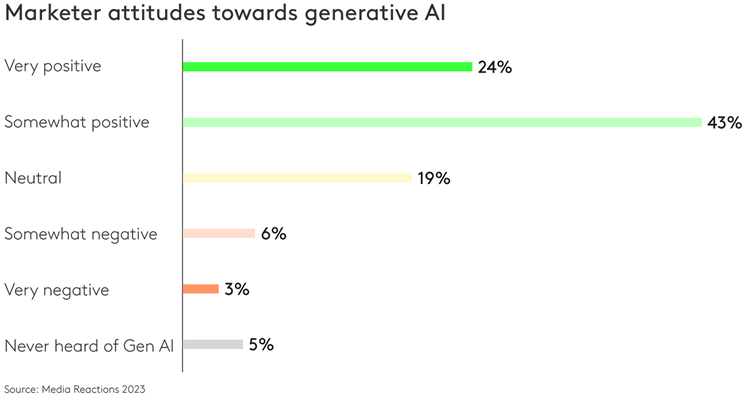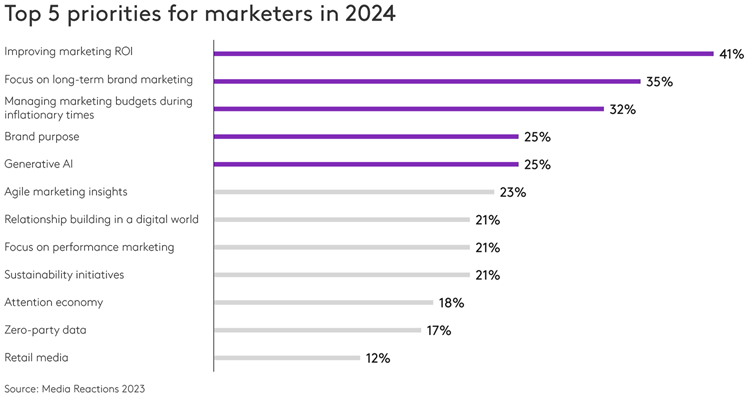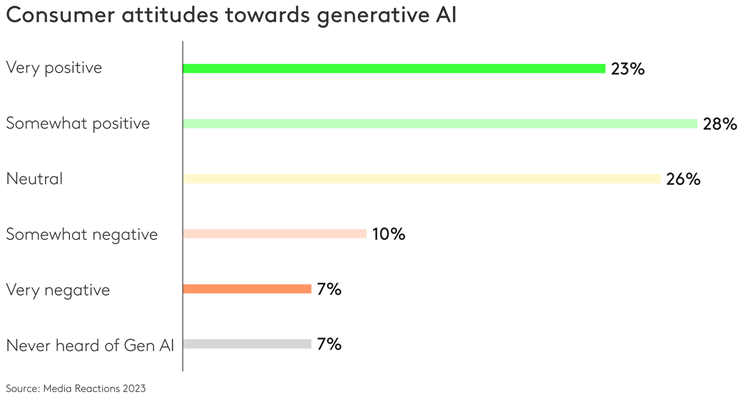There’s much debate about AI and its implications for marketing and advertising, both behind the scenes, and at the forefront of activation. But is the industry falling for hype, or being realistic? And what do consumers think?
New research from Kantar, conducted as part of our Media Reactions study 2023, sheds some light on marketers’ and consumers’ attitudes towards generative AI. We surveyed around 16,000 consumers in 23 markets and 900 marketers globally.
Global marketers
It may surprise you – or it may not – that two thirds (67%) of marketers globally are somewhat or very positive about generative AI. This varies by generation among other things. More than 8 in 10 marketers (83%) think positively about it among Gen Z, while the figure falls to below 65% for Gen X and Boomers. The younger the marketers the more open to GenAI they are. While these figures are all hopeful, inevitably, having an opinion isn’t universal: 5% of marketers haven’t even heard of GenAI. These marketers are mostly female or non-Gen Z marketers.

However, among the many concerns that marketers need to wrestle with, AI certainly isn’t top of the list of marketers’ priorities.
- Over 4 in 10 (40.8%) say that improving marketing ROI is their number one concern; understanding effectiveness and ROI will naturally take top position when marketing is one of the largest investments made by brands. However, only 23% organizations measure both return on sales and brand equity in a unified way. Measuring the impact of marketing efforts on sales, marketers can leverage brand health data, scaling and future proofing marketing efforts.
- Second is long term brand marketing, with 35.4% citing brand building. The short term/long term debate rumbles on but most brand marketers understand that you need to create predisposition as well as build future demand, whatever category you operate in.
- Third, nearly one third (32.4%) want to be able to manage marketing in a time of inflation. With supply chain costs, media investment and most other levers subject to price rises, marketers need to understand the pricing power of their own products and services so that they can pitch it right to consumers while maintaining their margins.
- In fourth place, a quarter of marketers (25%) cite purpose as their priority. Among one of the challenges debated and tackled by marketers, brand purpose is a big topic, including sustainability and I&D. Clarity of brand positioning, and how it’s activated, is paramount here.
- Generative AI takes fifth position, at 24.5%. It’s still early days to understand the ramifications. The industry is wrestling with the possibility that GenAI will radically transform marketing and advertising process, even creating the advertising itself. Certainly, behind the scenes changes to support data quality and data analysis are further ahead in their evolution.

But marketers think that AI is useful; 54.5% of marketers globally think that generative AI is a good way to test creative that isn’t otherwise measured. Marketers can benefit from cost-effective tools like Kantar LinkAI, the artificial intelligence-based tool, designed for speed and scale, able to test more of their advertising than ever before and access their results as early as 15 minutes.
Global consumers
Consumers, meanwhile, are less positive than marketers about generative AI. Just over half (51.5%) of consumers globally are somewhat or very positive towards it. For now, generative AI won’t really affect consumers in an obvious way so it’s likely that this is just from hearing news about it, rather than being aware of direct interactions with it (for example in HR recruitment processes). And 6.6% of consumers globally say they haven’t heard of generative AI.
The sentiment varies majorly from region to region, with people in Europe much less positive. Only 32% of European consumers say they feel positively about the possibilities of GenAI, while the figure rises to more than 75% in Southeast Asia and Africa and the This varies by gender and age; men are more positive towards generative AI than women, and above 50s are much less so compared to younger generations. Boomers are actively negative towards it. These divides are quite interesting and suggest a difference in experiences of different consumer groups in their exposure to generative AI. ChatGPT and generative art are among the technologies that consumers are likely to be more exposed to, and these might affect their views about GenAI as a whole.




